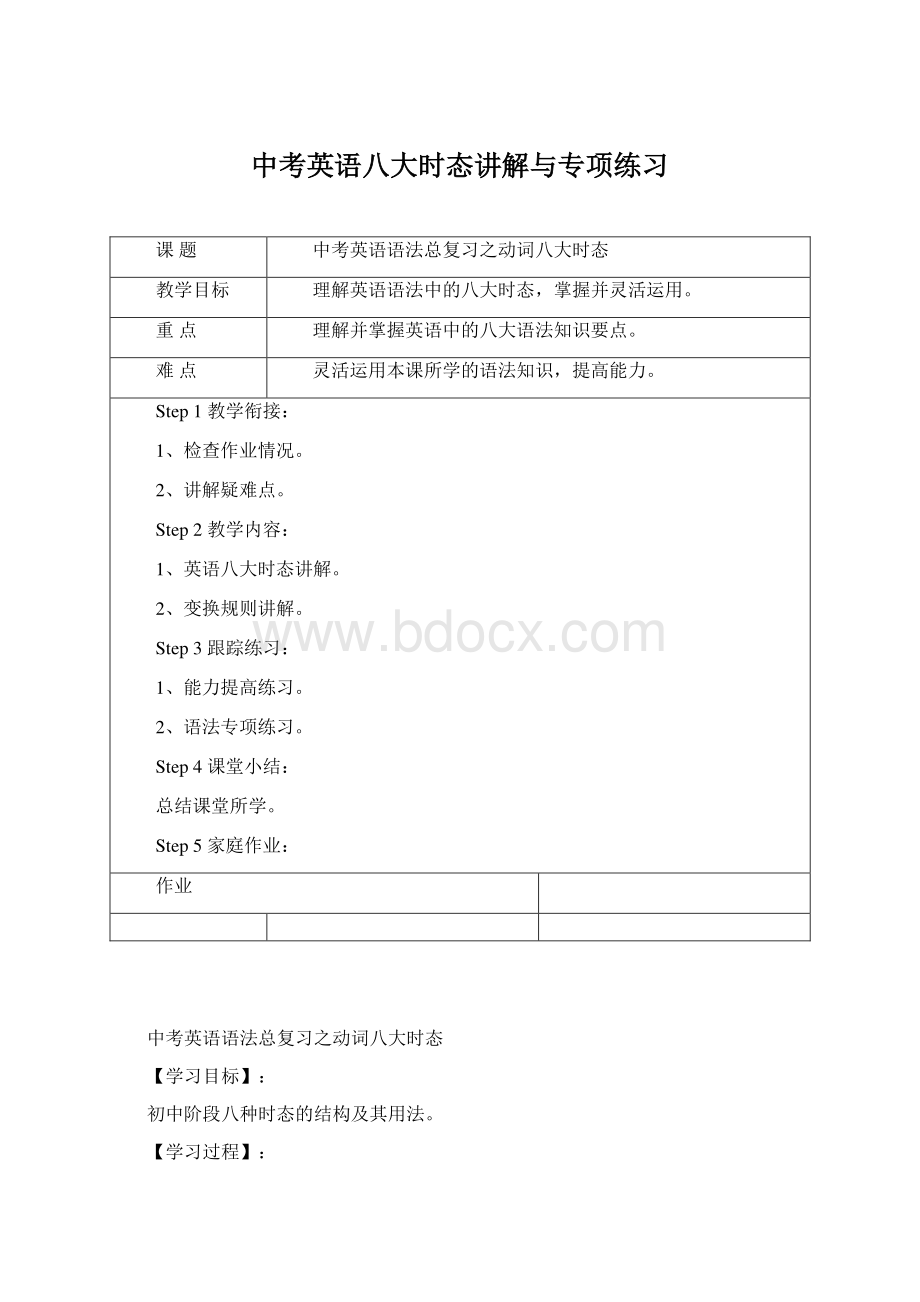中考英语八大时态讲解与专项练习.docx
《中考英语八大时态讲解与专项练习.docx》由会员分享,可在线阅读,更多相关《中考英语八大时态讲解与专项练习.docx(22页珍藏版)》请在冰豆网上搜索。

中考英语八大时态讲解与专项练习中考英语八大时态讲解与专项练习课题中考英语语法总复习之动词八大时态教学目标理解英语语法中的八大时态,掌握并灵活运用。
重点理解并掌握英语中的八大语法知识要点。
难点灵活运用本课所学的语法知识,提高能力。
Step1教学衔接:
1、检查作业情况。
2、讲解疑难点。
Step2教学内容:
1、英语八大时态讲解。
2、变换规则讲解。
Step3跟踪练习:
1、能力提高练习。
2、语法专项练习。
Step4课堂小结:
总结课堂所学。
Step5家庭作业:
作业中考英语语法总复习之动词八大时态【学习目标】:
初中阶段八种时态的结构及其用法。
【学习过程】:
I.概述:
英语中,不同时间发生的动作或存在的状态要用不同的动词形式来表示。
动作发生的时间不同,动词的形式就有所不同。
所以,动词的时态就是指动词在某一个时间段内应当采取的相应动词形态。
我们已经学过的八种时态分别是:
1._2._3._4._5._6._7._8._Step1中考英语八大时态讲解与练习1一般现在时a表示经常发生的动作、行为或存在的状态。
常用的时间状语有:
often,usually,always,everyday等。
IgotoschooleverydayexceptSunday.除了星期日,我每天上学。
Therearefiftystudentsinourclass.我们班上有五十个学生。
b表示一种客观事实或普遍真理Theearthisround.地球是圆的.Thesunisbiggerthanthemoon.太阳比月亮大。
c在条件状态从句和时间状语从句中,用一般现在时表示将来。
Ifyoudontgosoon,youllbelate.如果你不快去的话,你就要迟到了。
Iwillwaitforyouuntilyoucomeback.我将一直等到你回来。
动词三单形式的变化规则:
1.大多数动词直接+s2.以s,sh,ch,x,o结尾的动词+es3.以辅音字母+y结尾的动词变y为i+es一般现在时专项练习题用括号内动词的适当形式填空。
1.Heoften_(have)dinnerathome.2.DanielandTommy_(be)inClassOne.3.We_(notwatch)TVonMonday.4.Nick_(notgo)tothezooonSunday.5._they_(like)theWorldCup?
6.What_theyoften_(do)onSaturdays?
7._yourparents_(read)newspaperseveryday?
8.Thegirl_(teach)usEnglishonSundays.9.SheandI_(take)awalktogethereveryevening.10.There_(be)somewaterinthebottle.11.Mike_(like)cooking.12.They_(have)thesamehobby.13.Myaunt_(look)afterherbabycarefully.14.Youalways_(do)yourhomeworkwell.15.I_(be)ill.Imstayinginbed.2.一般过去式肯定式否定式疑问式一般动词I(You,He,She,We,They)workedthere.I(You,He,She,We,They)didnotworkthere.Didyou(I,he,she,we,they)workthere?
be动词I(He,She,It)wasthere.We(You,They)werethereI(He,She,It)wasnotthere.We(You,They)werenotthere.WasI(he,she,it)there?
Wereyou(we,they)there?
have动词I(You,He,She,We,They)hadbooks.I(You,He,She,We,They)hadnot/didnthaveanybooksHadI(you,he,she,we,they)anybooks?
或DidI(you,he)haveanybooks?
动词过去式的构成:
(1)规则动词过去式的构成有四条规则:
一般在动词原形末尾直接加上-ed。
如:
look-looked。
以不发音的字母e结尾的动词,去e再加-ed。
如:
live-lived。
末尾只有一个辅音字母的重读闭音节,先双写这个辅音字母,再加-ed。
如:
stop-stopped。
末尾是辅音字母+y结尾的动词,先变y为i,然后再加-ed。
如:
study-studied。
(2)不规则动词的过去式需特殊记忆。
如:
am(is)-was,are-were,go-went,take-took,have(has)-had等。
a表示在过去某一时间内发生的动作或存在的状态,常与表示过去的时间状语连用,如:
yesterday,lastweek,anhourago,theotherday,justnow,uponatime,in1989,intheolddays,whenIwasatmiddleschool等。
HeleftforBeijingyesterdaymorning.他昨天上午到北京去了。
Shewasntathomelastnight.她昨晚上在家。
Didyoufinishyourworkatfouryesterdayafternoon?
你昨天下午四点完成工作了吗?
b表示过去经常或反复发生的动作。
Igotupveryearlyatthattime.我那时总是起得很早。
Maryalwaysgotuptoolateandneverhadenoughtimeforbreakfastwhenshewasatmiddleschool.玛丽上中学时总是起得很晚,从来都没有足够时间吃早饭。
一般过去时专项练习题:
1MyfatherillyesterdayAisntB.arentC.wasntD.werent2yourparentsathomelastweekAIsBWasCAreDWere3ThetwinsinDalianlastyearTheyherenowAare;wereBwere;areCwas;areDwere;was4yourfatheratworkthedayyesterday(前天)AWas;beforeBIs;beforeCWas;afterDIs;after5WhowasondutylastFridayAIamBIwasCYes,IwasDNo,Iwasnt二、请用正确动词形式填空。
(10)1.I_(have)anexcitingpartylastweekend.2._she_(practice)herguitaryesterday?
No,she_.3.What_Tom_(do)onSaturdayevening?
He_(watch)TVand_(read)aninterestingbook.4.Theyall_(go)tothemountainsyesterdaymorning.5.She_(notvisit)herauntlastweekend.She_(stay)athomeand_(do)somecleaning.3一般将来时肯定式否定式疑问式I(We)shall/willgothereI(We)shall/willnotgothereShallI(we)gothere?
You(He,She,They)willgothereYou(He,She,They)willnotgothereWillyou(he,she,they)gothere?
a表示将要发生的动作行为或存在的状态。
常与表示将来的时间状语连用,如:
tomorrow,nexttime,nextyear,inafewdays等。
IllgoandseehernextFriday.我下周五去看她。
Hewontgotheretomorrowmorning.他明天上午不到那儿去。
Willyoudoitagain?
你再做一遍好吗?
b没有时间状语,根据上下文判断其谓语动作是将要发生的。
Idontknowwhowilldoit.我不知道谁将做这件事。
Dontworry,hewillbethereontime.别着急,他会准时在那儿。
c表示将来经常发生的动作。
FromnowonIllgetupearlyeverymorning.从今以后,我每天早晨早起。
注意:
1)begoingto这个结构表示:
a即将发生的动作;b主语打算或准备要做的事;c说话人根据已有的迹象判断即将发生的事。
begoingto结构中的be随着句子中主语的人称而变化。
例如:
WearegoingtolearnEnglish.我们将学习英语。
Howareyougoingtospendyourholidays?
你们打算怎样度过假期?
Lookattheseblackclouds.Ithinkitsgoingtorain.看这些黑云,我想天要下雨了。
2)在时间状语从句和条件状语从句中,一般将来时要用一般现在时代替。
Hewillcometoseeyouwhenhehastime.他有空时会来看你的。
Theywillringyouupassoonastheygetback.他们一回来就打电话给你。
一般将来时专题练习题1、选择填空1.There_ameetingtomorrowafternoon.A.willbegoingtoB.willgoingtobeC.isgoingtobeD.willgotobe2.Charlie_herenextmonth.A.isntworkingB.doesntworkingC.isntgoingtoworkingD.wontwork3.He_verybusythisweek,he_freenextweek.A.willbe;isB.is;isC.willbe;willbeD.is;willbe4.There_adolphinshowinthezootomorrowevening.A.wasB.isgoingtohaveC.willhaveD.isgoingtobe5._you_freetomorrow?
No.I_freethedayaftertomorrow.A.Are;goingto;willB.Are;goingtobe;willC.Are;goingto;willbeD.Are;goingtobe;willbe6.Mother_meanicepresentonmynextbirthday.A.willgiveB.willgiveC.givesD.give7.ShallIbuyacupofteaforyou?
_.(不,不要。
)A.No,youwont.B.No,youarent.C.No,pleasedont.D.No,please.8.Whereisthemorningpaper?
I_ifforyouatonce.A.getB.amgettingC.togetD.willget9._aconcertnextSaturday?
A.TherewillbeB.WilltherebeC.TherecanbeD.Thereare10.Iftheycome,we_ameeting.A.haveB.willhaveC.hadD.wouldhave4现在进行时表示说话时或现阶段正在进行或发生的动作,常与时间状语now,thisweek,thesedays等连用。
肯定句:
主语+be(is/am/are)+现在分词否定句:
主语+be(is/am/are)+not+现在分词一般疑问句:
be(is/am/are)+主语+现在分词特殊疑问句:
特殊疑问词+相应be动词+主语+现在分词+Sth?
变化规则1.直接+ing(例:
sleep+ingsleeping)2.去掉不发音的e+ing(例:
biting,leaving,making,coming,writing.)注意:
如果单词结尾的e发音,则不能去掉,也直接加ing.例如:
see-seeing/agree-agreeing.3.以ie结尾变ie为y+ing(例:
die-dyinglie-lying)4.对于重读闭音节词,双写末尾字母再加ing.例如:
sitting,beginning,getting,putting,running,stoppingcutting,controlling肯定式否定式疑问式Iamworkingnow.Iamnotworkingnow.AmIworkingnow?
Youareworkingnow.He(She)isworkingnow.We(You,They)areworkingnow.Youarenotworkingnow.He(She)isnotworkingnow.We(You,They)arenotworkingnow.Areyouworkingnow?
Is(he,she)workingnow?
Areyou(we,they)workingnow?
a表示说话时谓语的动作正在进行。
Whoareyouwaitingfor?
你在等谁?
Heknowsthatwearehelpinghimnow.他知道我们现在正在帮助他。
b在现阶段正在进行的动作,但不一定说话时动作正在进行。
Thestudentsareworkingonthefarmtheredays.这些天学生们正在农场劳动。
c有些动词的进行时态还可用来表示将来时。
这类动词有go,come,leave,arrive,move,die等。
Heiscomingsoon.他不久就要来了.Maryisarrivinghereat4o/clockthisafternoon.玛丽今天下午四点到达这里。
注意:
1)表示状态或感觉的动词,如:
know,love,like,want,hear,see,think等,一般没有进行时态,因为它们不能表示正在进行的动作。
但是,如果词义发生变化,能表示一个正在进行的动作,也可使用进行时态。
Stop,Iamthinking.停下来,我正在想问题呢。
2)无法延续动作的动词,如:
jump,begin,start,stop等一般不宜用于进行时态。
但是,若想表示动作反复或即将发生,也可使用进行时态。
Heisjumpingupanddown.他一下一下地跳个不停。
现在进行时专项练习题()1.我在照看孩子.(A)Iamlookingafterthebaby.(B)Imlookafteringthebaby.(C)Ilookamafteringthebaby.(D)Ilookingafterthebaby.()2._friendsmaking_akite.(A)I,me(B)My,my(C)My,me(D)His,his()3.Isthewoman_yellowyourteacher?
(A)in(B)puttingon(C)wearing(D)having()4.Look!
Thetwins_theirmotherdothehousework(A)arewanting(B)help(C)arehelping(D)arelooking()5._arethebirdsdoing?
Theyaresinginginatree.(A)Who(B)What(C)How(D)Where()6.Isshe_something?
(A)eat(B)eating(C)eatting(D)eats()7.你在干什么?
(A)Whatisyoudoing?
(B)Whatareyoudo?
(C)Whatareyoudoing?
(D)Whatdoyoudo?
()8.Whatareyoulistening_?
(A)/(B)for(C)at(D)to()9.我正在听他说话.(A)Ilisteningtohim.(B)Imlisteningtohim.(C)Imlistentohim.(D)Imlisteninghim.()10.Theyare_theirclothes.(A)makeing(B)putting(C)putaway(D)puttingon(5.过去进行时表示过去某个时刻或过去一段时间正在进行的动作。
常与表示过去的时间状语如:
thenatthattime,once,amomentago等连用,或者用另一动作表示过去的时间。
Iwaswritingaletterathomeatsevenyesterdayevening.我昨晚七点在家写信。
HewaswatchingTVwhenIcamehomeyesterdayevening.当我昨晚回家的时候他正在看电视一般疑问句及答语:
Was/Were+主语(You/he/she/they/we)+doing+其它Yes,Iwas./No,Iwasnt.Wereyouplayingbasketballatfouryesterdayafternoon?
昨天下午四点你们在打篮球吗?
特殊疑问句=特殊疑问词+was/were+主语(I/you/he/she/they/we)+doing+其它过去进行时专项练习题一、用动词的适当形式填空。
1.I_(have)mybreakfastathalfpastsixyesterdaymorning.2.Mary_(go)overherlessonsfromsixtosevenlastnight.Johnandpeter_(do)thesamething.3.What_you_(do)atthattime?
We_(watch)TV.4.Wasyourfatherathomeyesterdayevening?
Yes,hewas.He_(listen)totheradio.5.They_(notmake)amodelshipwhenIsawhim.二、选择题。
1.I_cookedamealwhenyou_me.a.cooked,wereringingb.wascooking,rangc.wascooking,wereringingd.cooked,rang2.Hesaidhe_todrawaplaneontheblackboardatthattime.a.triesb.triedc.wastryingd.willtry3.Whileshe_TV,she_asoundoutsidetheroom.a.waswatching,washearingb.watched,washearingc.watched,heardd.waswatching,heard4.They_afootballgamefrom7to9lastnight.a.werewatchingb.watchc.watchedd.arewatching5.Whatbook_you_whenI_youatfouryesterdayafternoon?
a.did,read,wasseeingb.did,read,sawc.were,reading,sawd.were,reading,wasseeing6.现在完成时:
基本结构:
主语+have/has+done肯定句:
主语+have/has+done+宾语.否定句:
主语+have/has+not+done+宾语.一般疑问句:
Have/Has+主语+done+宾语.肯定回答:
Yes,主语+have/has.否定回答:
No,主语+havent/hasnt.特殊疑问句:
特殊疑问词+一般疑问句(have/has+主语+done+其他)用法:
1.常与for(+时间段),since(+时间点或过去时的句子)连用.for+时段为时间since+过去一个时间点(译为:
自从以来)since+时段+agosince+从句(过去时)Itis+时段+since+从句(过去时)标志词:
already(肯定),yet(否定,疑问),just,before,recently,ever,never,.times(次数).瞬间性动词可表示某一动作的完成但是当后面有表示一段时间的状语时要变成相应的延续性动词瞬间性动词改为延续性动词:
buy-hadborrowkeptleave-beawaystop-beoverdie-bedeadarrive-bein/atleave-beaway(from)begin/start-beoncome/go-bein/atfinish/end-beoverfallasleep-beasleepcome/go/become-beputon-beongoout-beoutgetmarried-bemarriedjoin-bein/amemberofcometowork-workbegintostudy-studyhave(has)beento与have(has)gonetohave(has)beento+某地,表示到过某地,说明去过某地,说话时已经回来了。
have(has)goneto+某地,说明去某地了,说话时还没有回来。
【拓展】一般过去时与现在完成时的相互转换:
在现在完成时中,延续性动词能与表示一段时间的状语连用,瞬间动词却不能。
但是,可用别的表达方式:
瞬间动词用于“一段时间+ago”的一般过去时的句型中;瞬间动词可改成与之相对应的延续性动词及短语,与一段时间连用;瞬间动词用于“Itis+一段时间+since+一般过去时”的句型中,表示“自从以来有时间”的意思,主句一般用itis来代替Ithasbeen;瞬间动词用于“Sometimehaspassedsince+一般过去时”的句型中。
如:
A.HejoinedtheLeaguetw